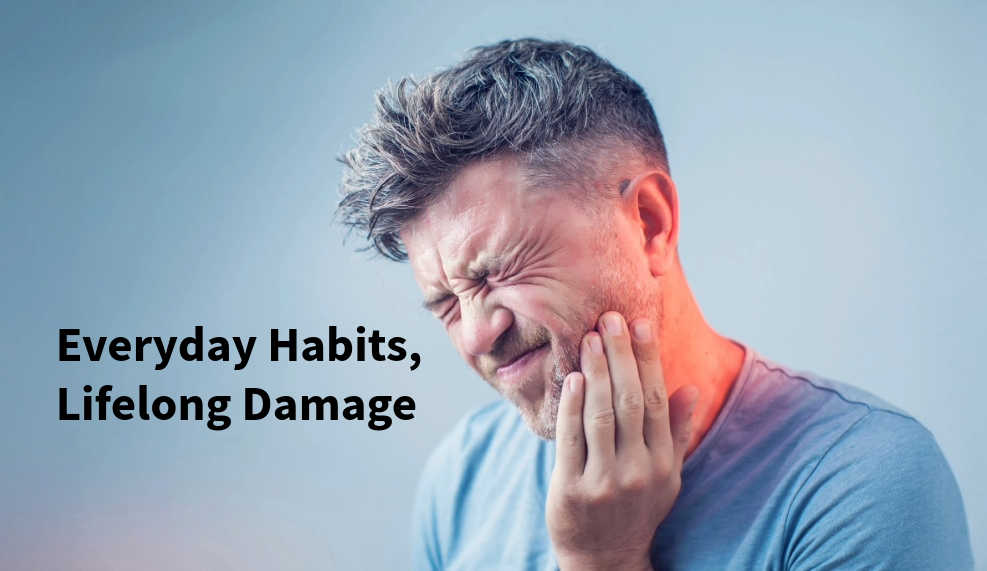When we think about what can damage our health, smoking, poor diet, or lack of exercise often come to mind. However, we can overlook things dentists see every day: habits and choices that quietly destroy teeth and affect overall well-being.
Dr. Brett Richins, a practicing dentist in Utah and director of Ultradent’s clinical team, has seen the consequences firsthand. “I actually had an 18-year-old patient who needed all of his teeth removed,” he explains. The cause? A near-constant diet of soda.
The Hidden Danger of Sugary Drinks
The patient arrived at an emergency dental clinic with severe pain. “There was nothing left in his mouth that resembled a tooth.,” Richins says, recalling the examination. “Everything was worn down to nubs that were quite soft.”
The culprit was a habit the patient started in childhood which escalated into a condition known unofficially as “Mountain Dew mouth.” The condition results from frequent soda consumption, often starting as early as infancy.
When consuming these drinks, frequency of exposure matters as much as volume. “For your teeth, it’s basically the same impact if you drink 10 sodas a day or you drink two but sip on them every five minutes all day,” Dr. Richins says. The constant bath of acid and sugar erodes enamel and feeds harmful bacteria.
In the case of the 18-year-old with teeth destroyed by soda, Dr. Richins says he was even using sugary drinks to cope with the pain of his condition. “The only thing that makes my teeth feel better is to swish with this,” the patient told Dr. Richins while holding a two-liter bottle of Mountain Dew.
The Real Cost of Tooth Loss
The long-term consequences of such habits are profound. When teeth can’t be saved, dentures often become the only option. But the two are not equal.
“A denture is not a good replacement for teeth. It’s a replacement for not having teeth,” Dr. Richins explains. Dentures change how patients taste and experience food; can make it difficult to eat fruits, vegetables, and protein; and often lead to reliance on softer, carbohydrate-heavy foods.
Over time, the jawbone itself deteriorates without the stimulation of tooth roots or implants. This bone loss can alter facial appearance, increase the risk of fractures, and make dentures even harder to wear. While implant-supported solutions can improve outcomes, they can cost tens of thousands of dollars, an expense out of reach for many patients.
DIY Dentistry
Not all dental dangers come from diet. Sometimes, they stem from misplaced self-reliance. Dr. Richins recounts the case of a patient who tried to reattach a dental bridge at home using a Dremel tool and epoxy. The attempt traumatized gum tissue, introduced bacteria into the bloodstream, and led to infective endocarditis, a life-threatening heart infection.
Sleep Apnea: The Silent Threat Dentists Can Spot
Beyond cavities and infections, dentists also screen for conditions many patients don’t associate with oral health, like sleep apnea.
“When I see teeth that are severely worn down, it can be a sign of airway blockage and nighttime grinding,” Dr. Richins explains. Once considered little more than an inconvenience, snoring is now understood as a warning sign of obstructed breathing linked to heart attack, stroke, and other serious risks.
While dentists cannot diagnose sleep apnea, they can screen and refer patients for medical evaluation. In many cases, custom oral appliances designed by dentists help open the airway and reduce both snoring and sleep apnea episodes.
What Patients Can Do
Everyday habits can have lifelong consequences. To protect oral and overall health, you can:
- Limit frequency of sugary and acidic drinks. If you must indulge, use a straw and drink with meals.
- Maintain consistent hygiene. Brushing, flossing, and professional cleanings are critical.
- Seek professional help for dental issues. DIY fixes can put your overall health at risk.
- Take snoring seriously. Talk to your dentist about screening for sleep apnea.
As Dr. Richins puts it, the most important step is education. “Many people think, ‘My family has bad teeth’ and believe that’s their destiny. But the much larger contributing factors are diet and hygiene, which really comes down to understanding.”
FAQ:
Q: Why is soda so harmful to teeth?
A: Soda combines high sugar content with acidity. This constant exposure erodes enamel and feeds harmful bacteria. As Dr. Brett Richins explains, “For your teeth, it’s basically the same impact if you drink 10 sodas a day or you drink two but sip on them every five minutes all day,”
Q: Is it worse to sip soda slowly throughout the day or drink it quickly?
A: Sipping throughout the day is worse because it continually bathes your teeth in acid and sugar. Drinking with meals and limiting frequency gives your mouth time to recover and buffer itself. Using a straw can also reduce direct contact with teeth.
Q: What is “Mountain Dew mouth”?
A: “Mountain Dew mouth” is a term used in dentistry to describe severe tooth decay caused by frequent soda consumption, often beginning in early childhood. It can lead to total tooth loss, even in teenagers.
Q: Are dentures a good replacement for natural teeth?
A: Dentures restore basic function but do not fully replicate natural teeth. As Dr. Richins notes, “A denture is not a good replacement for teeth. It’s a replacement for not having teeth.” Dentures affect how food tastes and how well patients can chew, often limiting diet and nutrition.
Q: Why does the jawbone shrink after tooth loss?
A: Teeth stimulate the jawbone. Without roots or implants, the bone begins to deteriorate. Over time this can change facial appearance, make dentures harder to fit, and increase the risk of jaw fractures.
Q: Can I fix a loose crown or bridge at home?
A: No. DIY dental fixes can cause serious injury or infections. One patient Dr. Richins described developed a life-threatening heart infection (infective endocarditis) after attempting to glue a bridge back with epoxy. Always seek professional dental care.
Q: Why do dentists talk about sleep apnea? Isn’t that a medical issue?
A: Dentists cannot diagnose sleep apnea, but they are in a unique position to screen for it. Signs such as worn teeth, airway obstruction, and patient history can point to possible sleep apnea. Dentists refer patients to medical providers for diagnosis, and in many cases, they can provide oral appliances that reduce snoring and help manage sleep apnea.
Q: How is snoring connected to overall health?
A: Snoring can signal blocked airways and disrupted breathing during sleep. Sleep apnea increases the risk of heart attack, stroke, and other systemic health problems. It should not be ignored.
Q: What’s the single best thing I can do to protect my teeth?
A: Limit sugary and acidic drinks, maintain consistent brushing and flossing, and see your dentist regularly. Education and prevention are far more effective, and less costly, than treatment after damage has already occurred.
About Dr. Brett Richins

Dr. Brett Richins completed his undergraduate degree in biomedical engineering at the University of Utah, followed by his dental education at the University of Pittsburgh School of Dental Medicine, where he earned his DMD in 2012. In 2025, he furthered his education by completing an Executive MBA at the University of Utah, enhancing his expertise in dental practice management and leadership.
He has been practicing dentistry in Lehi, Utah, for over 12 years and is a founding partner of a multi-location group practice that integrates general and pediatric dental care. In addition to private practice, Dr. Richins is the director of clinical affairs at Ultradent Products, Inc., where he collaborates on the development and evaluation of dental materials and technologies.
Outside of dentistry, Dr. Richins enjoys spending time with his wife of over 20 years and their four children. He’s an avid outdoorsman and finds balance through mountain biking, hiking, snowboarding, and exploring the red rock landscapes of the Southern Utah.








